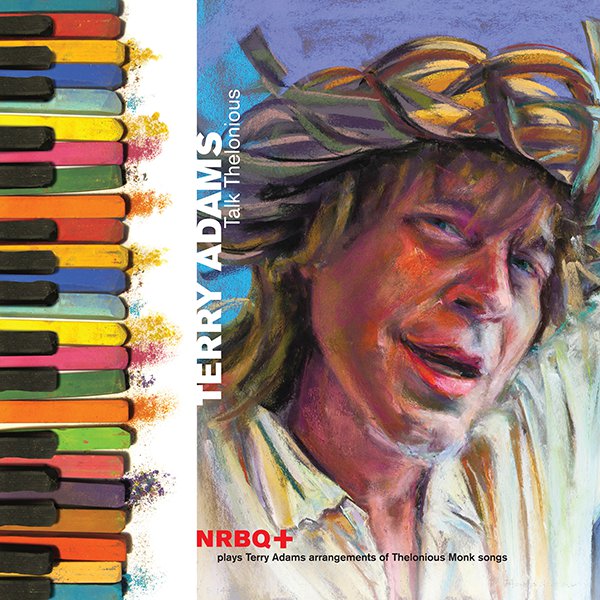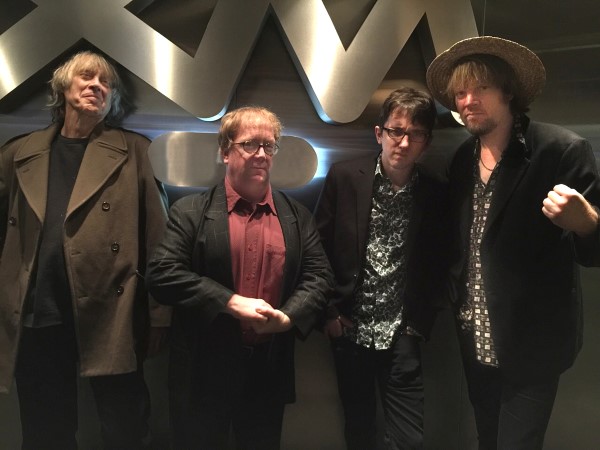
Terry Adams. Photo by Bud Fulginiti
How, you may ask, can a band that’s been around in various incarnations for half a century manage to elude the majority of the listening public? It’s largely because NRBQ’s reason for existing has always been to follow a restless muse wherever it leads.
“You know, some bands, some people, only get together to see if they can make something work―you know, work financially,” says founding member and keyboardist Terry Adams. “And so they try it and if it works, good. And if it doesn’t, they try something else. NRBQ is different. This is about some music that we believe in, and our approach to music is something that’s beyond that concept.”
That approach has never before been summarized so comprehensively as on the 5-disc retrospective High Noon, due out in November.
Adams counts among his earliest inspirations the pioneering jazz pianist Thelonious Monk and electronic experimentalist Sun Ra, both of whom he would later meet. Adams is as much an original in his own right, as his band’s hard-to-define body of work attests. The latest NRBQ-related project, the recently released Monk tribute Talk Thelonious, is a slight departure from the band’s abnormal norm. The album’s dozen tracks are true to Monk’s intrepid musical spirit but, thanks to Adams’ arrangements, are cut from cloth that’s clearly NRBQ. Adams―who will be bringing the ’Q to Nashville’s City Winery on Wednesday, Sept. 7―took time out from record shopping on a recent afternoon to chat with the Pulse about what’s been making NRBQ tick for five decades.
Murfreesboro Pulse: Can you believe that NRBQ is still active 50 years after the band first took shape?
Terry Adams: Yeah, I’m kind of amazed about it, really. It doesn’t seem that long. We just started playing the music how we felt. That’s all we ever did. I remember that, playing it at home, in the basement or whatever in the house. And we took it out to the stage. And when you’re doing that, I guess the time goes flying.
Yeah, 50 years, I’m proud of that, that we were able to keep it going. And it’s because the guys that are in the band, at least while they’re in the band, believe in it strongly. There’s been an awful lot of good bands that just haven’t lasted as long. It could be that for them, maybe the magic came and it went, you know? For me, I still think we’ve got more to say.
What’s your recipe for magic?
To be able to not have it planned out. Some bands do the same thing every night. It’s hard to get magic when you’re just going through some predetermined thing. . . . We don’t know what’s gonna happen [onstage]. And that’s when I’m happiest, when the unknown happens.
So, is the basic vision for the band still the same after five decades?
I think it has remained the same, because I’ve been doing it the same way. Everybody who’s ever been in the band brings in their own stuff, and as much as they want, they participate and contribute, and yeah, that definitely changes things. But as far as an outlook or a direction, that hasn’t changed. I was the first member and I’ll probably be the last. . . . I don’t know [chuckles]. It’s always fun, though. It’s about making music that feels right to the moment, and only what you wanna play.
Is there anything the current NRBQ lineup is doing that wouldn’t have happened 10 or 20 years ago?
I don’t think we would have done a tribute to Thelonious Monk. That’s NRBQ. It’s under my name, because it’s my arrangements. We could have done some [Monk] at certain times, and have, but part of that’s me being ready to do it. These guys really wanted to get on that music, and in a real short time got a really good handle on it. It [generally] takes years, I think.
Two of the songs that I’m proudest of on here, one is “Monk’s Mood.” Which, by the way, features Nashville’s own Jim Hoke on the chromatic harmonica and the pedal steel. And “Ruby My Dear” is a whole different viewpoint of the same song. It’s just as romantic, but it hasn’t been there, where I took it.
Thelonious Monk’s music has influenced you pretty profoundly, hasn’t it?
Yeah, I don’t know why, but just as soon as I heard it―I guess I was about 14 or so―I knew that this guy had something very special that I could learn from. And it’s not just about notes and chords, it’s about something else―something in the world, something about life. It came to me immediately. I always wanted to go to the masters. I met Sun Ra at an early age, and Thelonious as well. I know that they have something of real value for me. More than most.

Thelonious Monk was known to exhibit peculiar behavior and it’s long been speculated that he had a mental or psychological condition of some kind. Having known him, did it seem that way to you?
No, not at all. I think that the whole thing that goes with these stories should have been omitted. Sometimes if you were around him, he’d be teaching you something by not saying anything, or saying something that you don’t understand. So, some people could say, “Oh, he’s crazy,” but you’re crazy because you don’t understand what he said.
Why was it important to you to make the Talk Thelonious tribute album?
I believe that I owed something back. I took a lot in from him, and I wanted to give something back. So that you don’t just say “I really like this music and I’m a fan,” not only that but I have it in me, and I can give it back to the world. Playing his music isn’t just a matter of learning his songs and being clever or something, there’s a lot more to it. There’s a lot more in there that’s not so readily audible if you don’t really listen for it.
Has the experience of your 2004 cancer diagnosis, and coming through that, affected your thoughts on your life and work?
I was talking to Sun Ra one day, and I had a beer in my hand, maybe I’d had a few. And he said, without being direct about it, but he said it firmly, “You know, I hate to see a musician waste time.” And I thought, “Why’s he saying that?” But I realized later on that, you know, he was trying to tell me something. And I think you can coast sometimes, and you can have a good thing going but you sort of coast, and I’m maybe more aware of that, from that experience, I would say.
So, this conversation took place while you were battling cancer, and it inspired you?
No, he was gone by then. That was a long time ago he said that to me, and I thought about it way later, that he was talking to me [laughs]. “I hate to see a musician waste time”―it took me a few years to realize what he was actually saying to me.
Did you have much direct involvement in the High Noon 50th anniversary box set Omnivore Records will be releasing this fall?
I did advise them on some of it, because there’s some [rare material] that nobody knew about but me. That thing is going to be a good listening experience. Some people think of things like [a box set] as archival, like a librarian sort of sense of music. I don’t think of music that way, I think of it as the joy of listening to it. So, that’s what it’s gonna be. You put this disc on and it’s like you never heard it before. It’s about the experience of the moment. I can say that much, because I know that a lot of care went into the mastering and so on.
You have a ravenous musical appetite, don’t you?
Yeah, I listen to anything that comes along. I remember my parents would be visiting somebody, and that would be such a boring thing for me to have to be in on. I had to go to these people’s house, and I would just say, [adopting young boy voice] “Do you have any records?” And they’d say, “Yeah, I think there’s a stack of ’em in there.” Usually back then there’d be a stack of 78s, and they’d be, usually . . . the kind of music that wasn’t so thrilling, but I would listen to them anyway, just sit on the floor and play all their 78s, whether it be Eddie Fisher or whatever it is they were buying. That’s just the way that I was. I just wanted to hear all of the music.
I don’t have the category thing, because for as long as I can remember I didn’t understand the sort of attitude that “I’m going to be this way or that way, or dress like this.” Life is too big to sign up to these things.

NRBQ. Photo by Shirley Haun.
Was NRBQ designed to be a band that defies stylistic boundaries, or is that just how it naturally is?
I think people like to describe music in one way or other. “What kind of band are you in?” That’s a common question. So, when it comes to us, they have to say . . . since they don’t have the term [to describe us], then the term is “they like all kinds of things.” So that gets stuck on us, but sometimes we don’t [accommodate that description]. I don’t go around saying, “Watch all the different things we’re going to do”; that’s not the idea. Nobody’s trying to impress anybody with all the styles the band can play, that has nothing to do with it.
We don’t wanna bore anybody. What seems unnatural to some, to shift the music in a certain way, is only natural to me, because it’s supposed to stay interesting. It’s whatever inspires us. That’s really living. And people make music, all over the world. If you like people, then you like to communicate, you like to be able to understand. That’s just part of being alive, to me, as a musician. I really think so.
We’re not really the first band to be like this. I would say The Beatles were like that. Especially in their later years. They were doing more stuff than we’re doing. It’s not a big deal to be open-minded and be able to include any style you want on your record or whatever. I don’t know, I feel like the more I talk about it the more I sound like I want to talk about those differences, but I don’t really see those differences. I don’t feel them. We have something that is unique to our band, and that’s what people hear when they come to listen to us. That’s why people like us. They feel something. They feel something that helps them.
~~~
At 8 p.m. on Wednesday, Sept. 7, City Winery hosts NRBQ and Los Straitjackets, known for delivering classic surf-guitar instrumentals from behind full-head wrestling masks. With an inspired pairing this offbeat, anything could happen. For more information or to order tickets, visit citywinery.com.














Great interview! I can’t wait for the release of the High Noon box set 🙂 Happy Anniversary to the Q!!!
Comment September 6, 2016 @ 8:46 pm
I can’t wait for the new box set. I am partial to the Al Anderson era Q, but this new lineup is just as good.
When are they coming to play in California?
Comment September 24, 2016 @ 1:41 pm